- Home
- Darrell Maloney
Everything Has Changed
Everything Has Changed Read online
EVERYTHING HAS CHANGED
The Yellowstone Event:
Book 8
By Darrell Maloney
This is a work of fiction. All persons depicted in this book are fictional characters. Any resemblance to any real person, living or dead, is purely coincidental. A passage from The Snowdrift Fairies used with permission of Billie Holliman. Copyright 2019 by Darrell Maloney
This book is dedicated to Stephanie.
From the first time I held you in the palms of my hands I’ve loved you, almost so much that it hurt.
You are an incredible daughter. You always have been.
Now you’re an incredible woman, going through some very harsh times.
Don’t give up. You know you’ve got an awful lot of good people who care for you and who are pulling for you.
It’s not easy, I know. Keep trudging on until you put this ugliness behind you.
You got this.
I love you.
-Dad-
Here are some fun facts about the
Yellowstone Caldera:
- It’s a real thing. It really does exist
- It’s a super volcano simmering just beneath the surface of Yellowstone National Park
- It has erupted in the past, and will erupt again
- Scientists believe that when it erupts again it will destroy 20 percent of the United States
- You do NOT want to be in that 20 percent
Bearing all that in mind, enjoy the book…
*****************************************
A BRIEF RECAP…
*****************************************
In the weeks immediately following the Yellowstone eruption the United States was brought to her knees.
It was the biggest catastrophe ever to befall the nation. The death count exceeded all of America’s wars, all her deadly storms, all gun deaths and car crash deaths combined. The number of people displaced couldn’t even be calculated.
The federal government stepped up. The Department of Homeland Security and the Federal Emergency Management Agency overcame past missteps and aided the survivors in many ways.
They helped them relocate to safer areas in the country. Helped feed them. Helped create jobs for them.
And helped them bury their dead.
The real extent of the destruction, of course, wouldn’t be known for many years. Americans were damaged. Their psyches were bruised. Many of them, especially those who lost loved ones, weren’t sure whether they wanted to go on at all.
In the months and years ahead, tens of thousands would decide they didn’t like their new world, and would take their own lives. Their suicides wouldn’t be counted as part of the Yellowstone death count, though the eruption was certainly responsible.
Tens of thousands of others would die early deaths from respiratory diseases and new forms of cancer. Both would be an indirect result of the toxic ash which coated everything within a thousand miles in every direction and would take years to get rid of.
Many of the survivors would come to consider themselves the unlucky ones. They’d start to feel they’d be better off if they’d died, rather than live the rest of their lives in miserable conditions.
Those miserable conditions would include food and fresh water shortages, health problems and heartache for those who died, and an equally enormous group who were missing and presumed lost.
Our story focuses not on the dead, but on the survivors.
When we left Hannah and Tony and Gwen and Melvyn, they were still living in recreational vehicles east of Anchorage, Alaska. They spent their days helping new neighbors build their log cabins as they eagerly awaited the day the U.S. Army Corps of Engineers would deliver the building materials for their own cabins.
And they helped console a friend who’d just lost her husband in a drowning accident.
Our traveling authors, Rocki and Darrell, were preparing to leave the tiny town of Hays, Kansas.
Rocki had been a patient at Mount Kilgore Regional Medical Center while she recovered from her blast injuries.
The problem at hand was, even as they headed for the door, they still had no idea where they were going.
Little Rock was no longer an option; the ash fall was too great there, and recent rainstorms had turned it into something of a paste. Local officials were saying the toxic mess would be around for at least a generation, and the bleakest estimates were that life expectancies for the city’s residents would be shortened by five years or more.
The chitlins, who were always consulted on important family matters, couldn’t make up their minds between Alaska and the high desert of California.
And now, the final installment of the series:
EVERYTHING HAS CHANGED
Chapter 1
Little kids are lucky, in that they have many occasions throughout each year when they can look forward to visits from mythical or magical beings who bring them great stuff.
At Christmastime it’s Santa Claus, sometimes called St. Nick, depending on where in the world they happen to reside.
Whatever he’s called, this old and bearded fellow brings them great joy, along with toys, candy and other fun things.
Of course he also brings the footed pajamas from the kids’ Aunt Edna, knitted with one leg longer than the other and the missing buttonhole which makes the top crooked when buttoned.
But nobody’s perfect. Aunt Edna isn’t and Santa isn’t and it’s the thought which counts in the end.
In the spring it’s the Easter Bunny which brings them a bounty consisting mostly of candied or boiled eggs. Kids take their baskets and gather both with equal zeal, then quietly drop the boiled eggs into the waste basket when their parents’ backs are turned.
Nobody ever asks what the relation is between a big honking rabbit and eggs, of all things, since rabbits don’t lay eggs. Neither does anyone wonder how it is that a religious event observing the resurrection of Jesus got turned into a candy-grabbing free-for-all for children.
Kids never ask such questions because they’re afraid to upset the big bunny, lest he turn off the candy spigot.
Another candy grab comes in the fall, when one merely has to go knock on the doors of complete strangers, hold out an open bag and say “trick or treat” to reap the sugar bounty.
Then they go home and let their parents go through their bags in the guise of being safe and cautious. They watch their parents grab the best candies for themselves, and the whole family then rots their teeth together.
And of course we can’t forget the tooth fairy, who comes any time of year to bring a cash reward for any kid brave enough or greedy enough to rip out that loose tooth and to leave it beneath their pillow.
Kids have many more mysterious or mythical visitors who bring them or give them things seemingly for no reason.
That’s just one of the many reasons it’s more fun being a kid than a grown-up.
But adults have their benefactors as well.
Adults see commercials all the time of a man whose primary job is hawking magazine subscriptions, knocking on the door of an unwitting stranger. The man holds in his hands a bouquet of flowers and a check the size of a Volkswagen and changes the resident’s life forever.
By watching the resident’s good fortune on television we can glean a little bit of happiness ourselves.
But not, unfortunately, a share of the loot.
Sometimes we’re paid a visit by an attorney we’ve never heard of, who announces the passing of a distant relative we’ve never heard of. Or maybe Aunt Edna’s days of knitting defective pajamas have come to an end.
The attorney announces that we’ve been left a fortune.
Of course, for the vast majority o
f us whose families have never possessed vast fortunes, or even modest fortunes, this will never happen.
But it does for a few.
Another mythical creature we see only on the television, and who probably doesn’t really exist, is the guy who plucks numbered ping pong balls from something resembling a hot-air popcorn popper (if you don’t remember those you’re way too young).
The man in the cheap suit and the permanent smile on his face announces that the holder of a certain lottery ticket has won ten thousand trillion zillion dollars.
Many of us will hold lottery tickets.
Only one will win the jackpot.
I know it won’t be me, so I genuinely hope it’s you.
And hey, there’s an automatic bonus which goes along with the prize.
As the winner you will get to meet every second, third and fourth cousin you ever had, and some you didn’t have. For each one will suddenly crawl out of the woodwork and vie to be your very best friend forever and always.
Everyone you went to high school with will show up at your door and ask you for a loan.
Even those people you hated back then will apologize for being a jerk while holding their hand out at the same time.
The point, at last, is this:
We all have people or large animals or mythical creatures which bring us cool stuff from time to time.
Kids have it best.
They get the tooth fairy and Santa Claus and the Easter bunny.
Us old folks get an occasional winning scratch-off ticket or a visit from Ed McMahon or the postman bringing our tax refund.
Regions, and the people living within them, sometimes get goodies too.
New York City commuters occasionally stumble upon a seat on the subway train that isn’t soiled with urine or some kid’s lollipop-sticky fingerprints.
Thank you, Subway Fairy, for your kindness.
Chicago residents occasionally hail a cab which doesn’t reek of a previous fare’s body odor.
Great job, Chicago Cab Fairy.
Los Angeles residents occasionally leave at just the right time of day to commute those thirteen miles from work to home in only one hour instead of three.
Bless your heart, LA Freeway gods.
At Etlunka Lake, not far from Alaska’s largest city of Anchorage, a group of Yellowstone refugees were long past believing in the tooth fairy or Santa Claus.
But they still looked forward to the coming of a mythical creature that was to bring them a bounty of goodies.
Actually, this creature wasn’t mythical.
He really did exist, though he sometimes seemed as elusive as Bigfoot.
On the occasions he did show he brought more joy than the lottery guy and the Easter Bunny put together.
His name was Sid.
He worked for FEMA.
And he was by far the most popular guy at the lake.
Chapter 2
John Smith was an average guy with an average name for much of his life. He asked his parents once, when he was a teenager, why they didn’t use a little more imagination when they named him.
His parents, Bill and Mary Smith, didn’t understand his question.
They just couldn’t see what was wrong with having the same name as two thousand other people in New York City.
Son John, though, saw it as a major problem.
You see, he was nothing special; not really. He was of average intelligence. His grades were passing, and he understood the basics of math and science and literature.
But colleges wouldn’t be vying for his enrollment, and his mailbox would not be cluttered with scholarship offers. The Mensa selection committee would never darken his doorstep.
He’d love to have dated the head cheerleader, or any cheerleader at all, for that matter. But his average looks and above average acne problem certainly didn’t attract any.
He might be aided in his endeavor if he was a gifted athlete who threw winning touchdowns on Friday nights or hit one baseball after another deep into the stands.
But he wasn’t an athlete.
Not even a poor one. He was tall and lanky and clumsy.
He was ideally suited to be a watcher instead of a participator.
Assuming, of course, he could climb the steps into the bleachers without tripping over his own feet and rolling back down again.
No, everything about John Smith was vanilla… common… ordinary… just like everybody else.
John couldn’t make himself smarter or better looking or less of a klutz or more of an athlete.
The one thing he could change was his name.
So on his eighteenth birthday, the first day he could legally do so, he walked into the county courthouse and filled out the paperwork for a name change.
He kept the surname so as not to offend his parents.
His given name had to go, and from that moment on his legal name was Sid. No longer John, not quite Sydney.
Just Sid.
And he was so much happier.
Sid worked for the federal government for many years, just another bureaucrat doing his eight, clocking out each day promptly at five o’clock, and biding his time until retirement.
Then Yellowstone erupted and changed the world.
A call went out for FEMA employees who wanted to volunteer to help “in a really big way.”
Now, Sid had been working in FEMA’s procurement department for years, purchasing bottled water and dehydrated food and a thousand other things.
In a way, it hurt his feelings a bit.
He thought he’d always been helping “in a really big way.”
In another way, though, he knew what they meant.
Sitting in his cubicle placing orders and checking on shipping statuses each and every day, he’d never see the fruits of his labor.
He’d never actually meet the people who’d drink the water and eat the dehydrated food.
He’d never get a warm fuzzy by seeing how his efforts helped someone.
On the other hand, if he took FEMA up on their offer to send some employees to Alaska, where they’d work hands-on with some of the refugees, then perhaps that would give him the sense of accomplishment he’d been lacking.
And if he got no satisfaction there, at least he’d get the fat pay raise FEMA was offering to those employees who took them up on their offer.
He debated for two weeks, until the day before the job offer expired, before remembering an old adage his mom once embroidered onto a tapestry and hung in her kitchen:
NOTHING VENTURED,
NOTHING GAINED.
He figured what the heck.
Ten days later he stepped off an Alaskan Air flight in Anchorage and hailed a cab to the FEMA Employee Processing Center.
“We’ve got several options regarding your living arrangements,” he was told.
“We can put you up long term at one of the hotels in Anchorage. Along with that comes a generous per diem rate that’ll be more than enough to cover your meals and other expenses.
“Or, if you’re handy with tools, you can get a five acre plot of land at Etlunka Lake, where you’ll be assigned. You’ll go to the head of the line and get the next bundle of building supplies. The only drawback is that you’ll still be working full time for us, so you can only build your cabin on evenings and weekends.”
“I’ve never been very handy with saws and hammers and such. And I’ve got a bad back.”
“Perhaps Fort Richardson would be more suited to you.”
“Fort Richardson?”
“It was an Army post for decades. Then the Department of Defense got a wild hair and consolidated its military bases into what they called ‘joint bases.’
“Fort Richardson was consolidated with Elmendorf Air Force Base and became Joint Base Elmendorf-Richardson.
“When Yellowstone blew the Department of Defense agreed to declare it excess to their needs. The Army ceased operations. It kept a very small number of troops there to help with security of Joi
nt Base Elmendorf-Richardson and freed up all their post housing for Yellowstone evacuees.
“Have you ever been on a military base before?”
“Um… no. I was born and raised in New York City and there aren’t any bases there.”
“It’s just like a small city. In addition to comfortable housing there are supermarkets and convenience stores, shopping malls and a big hospital. Movie theaters, dining facilities, even bowling alleys. As a FEMA employee you’ll have access to everything.
“The military has funny names for everything. But it won’t take you long to memorize them all. You’ll know that an ‘exchange’ is a department store and a ‘commissary’ is a grocery store and a ‘class six’ is a liquor store.
“Once you memorize the terminology you’ll feel right at home. And we can even give you a cheat sheet to help you find your way around until then.”
“Is there a place on base where I can buy a used pickup truck?’
“Of course. It’s called the ‘lemon lot.’”
Chapter 3
Flash forward three months.
Sid was settled nicely into his base housing unit on Joint Base Elmendorf-Richardson, nicknamed “Elmer” by the locals.
Initially he’d faced his new assignment with some trepidation, but that didn’t last for long.
As it turned out, this was the best job Sid ever had. Far better than being a pencil pusher in a cubical, requisitioning disaster relief supplies.
No, here he was able to get outside and enjoy some of the prettiest scenery the world had to offer.

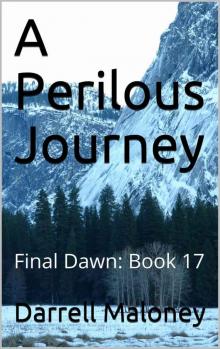 A Perilous Journey
A Perilous Journey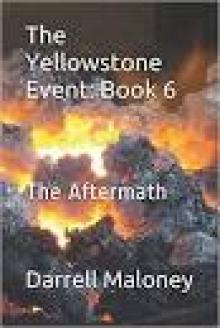 The Yellowstone Event: Book 6: The Aftermath
The Yellowstone Event: Book 6: The Aftermath Eden Bound
Eden Bound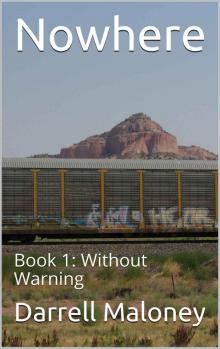 Without Warning
Without Warning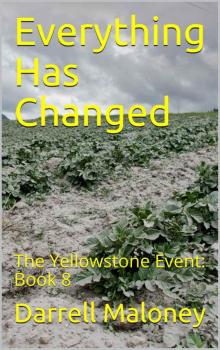 Everything Has Changed
Everything Has Changed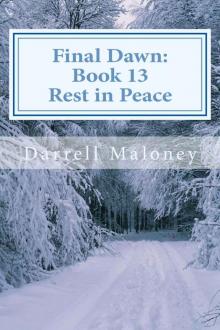 Rest in Peace
Rest in Peace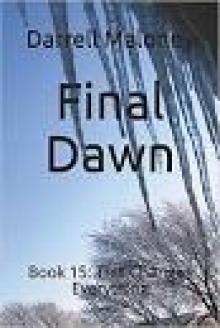 This Changes Everything
This Changes Everything The Final Chapter
The Final Chapter It Can't Be Her
It Can't Be Her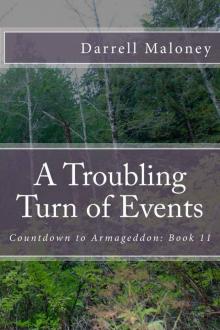 A Troubling Turn of Events
A Troubling Turn of Events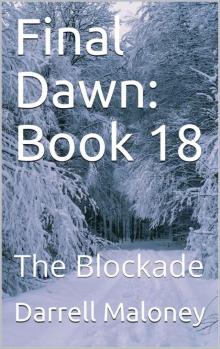 The Blockade
The Blockade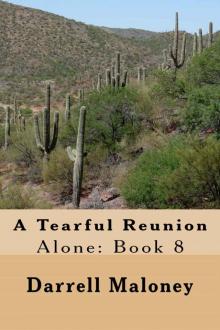 A Tearful Reunion
A Tearful Reunion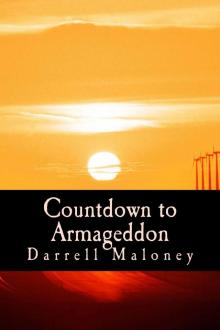 Countdown to Armageddon
Countdown to Armageddon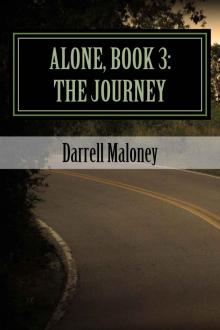 Alone, Book 3: The Journey
Alone, Book 3: The Journey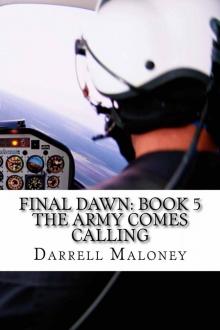 The Army Comes Calling
The Army Comes Calling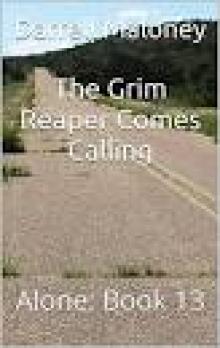 The Grim Reaper Comes Calling
The Grim Reaper Comes Calling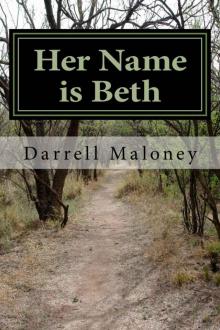 Her Name is Beth: Alone: Book 5
Her Name is Beth: Alone: Book 5 Red: The Adventure Begins
Red: The Adventure Begins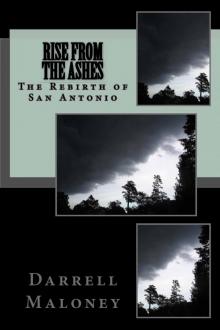 Rise From The Ashes: The Rebirth of San Antonio (Countdown to Armageddon Book 3)
Rise From The Ashes: The Rebirth of San Antonio (Countdown to Armageddon Book 3)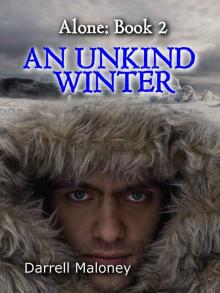 An Unkind Winter (Alone Book 2)
An Unkind Winter (Alone Book 2)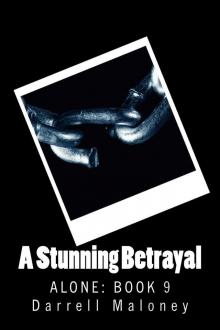 A Stunning Betrayal: Alone: Book 9
A Stunning Betrayal: Alone: Book 9 A Whole New World: Ranger: Book 2
A Whole New World: Ranger: Book 2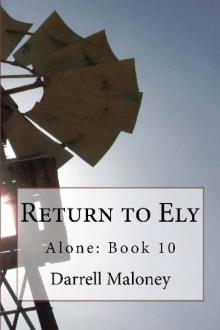 Return To Ely
Return To Ely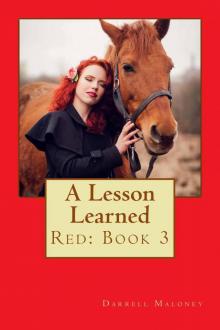 A Lesson Learned: Red: Book 3
A Lesson Learned: Red: Book 3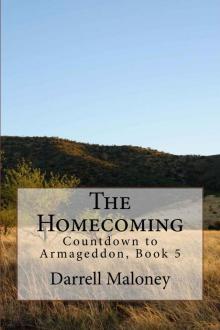 The Homecoming: Countdown to Armageddon: Book 5
The Homecoming: Countdown to Armageddon: Book 5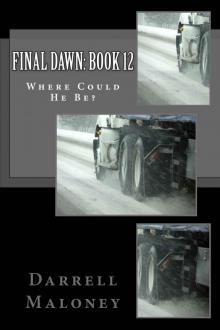 Final Dawn: Book 12: Where Could He Be?
Final Dawn: Book 12: Where Could He Be?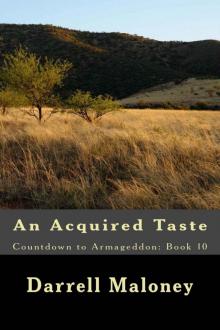 An Acquired Taste
An Acquired Taste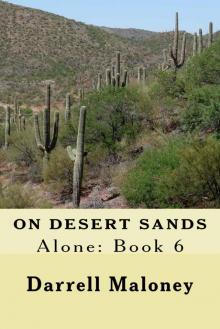 On Desert Sands: Alone: Book 6
On Desert Sands: Alone: Book 6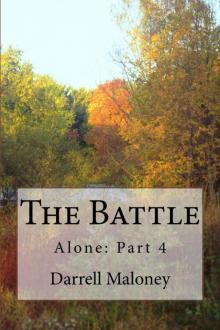 The Battle: Alone: Book 4
The Battle: Alone: Book 4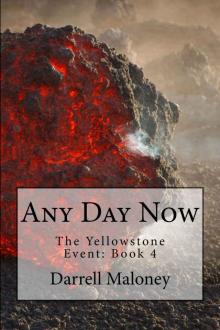 Any Day Now
Any Day Now Too Tough To Tame: Red: Book 2
Too Tough To Tame: Red: Book 2 No Help From Austin: Red: Book 5
No Help From Austin: Red: Book 5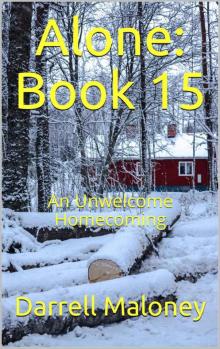 An Unwelcome Homecoming
An Unwelcome Homecoming A New Start: Final Dawn: Book 9 (Volume 9)
A New Start: Final Dawn: Book 9 (Volume 9)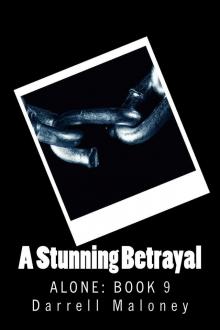 A Stunning Betrayal
A Stunning Betrayal An Undeclared War (Countdown to Armageddon Book 4)
An Undeclared War (Countdown to Armageddon Book 4)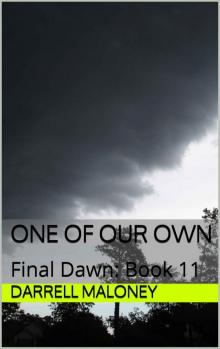 One of Our Own: Final Dawn: Book 11
One of Our Own: Final Dawn: Book 11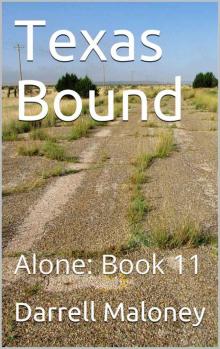 Texas Bound: Alone: Book 11
Texas Bound: Alone: Book 11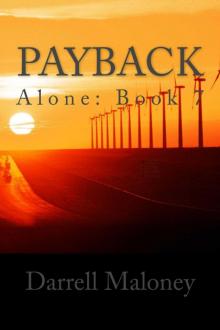 Payback: Alone: Book 7
Payback: Alone: Book 7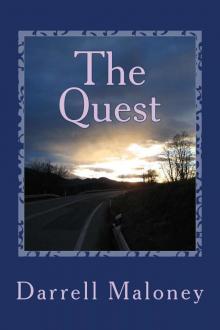 The Quest: Countdown to Armageddon: Book 6
The Quest: Countdown to Armageddon: Book 6 The Siege
The Siege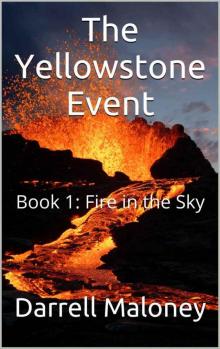 The Yellowstone Event: Book 1: Fire in the Sky
The Yellowstone Event: Book 1: Fire in the Sky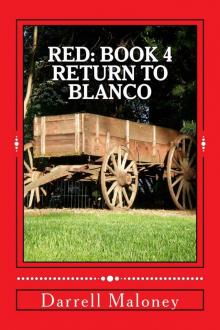 Return to Blanco (Red Book 4)
Return to Blanco (Red Book 4)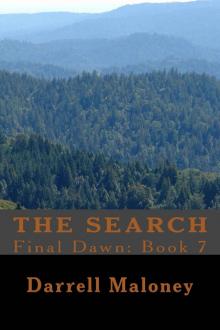 The Search
The Search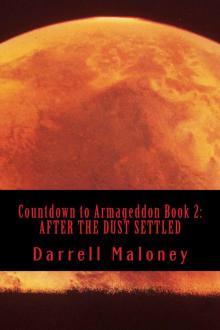 AFTER THE DUST SETTLED (Countdown to Armageddon Book 2)
AFTER THE DUST SETTLED (Countdown to Armageddon Book 2) Death Comes Calling (Ranger Book 3)
Death Comes Calling (Ranger Book 3)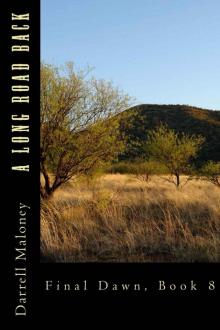 A Long Road Back: Final Dawn: Book 8
A Long Road Back: Final Dawn: Book 8